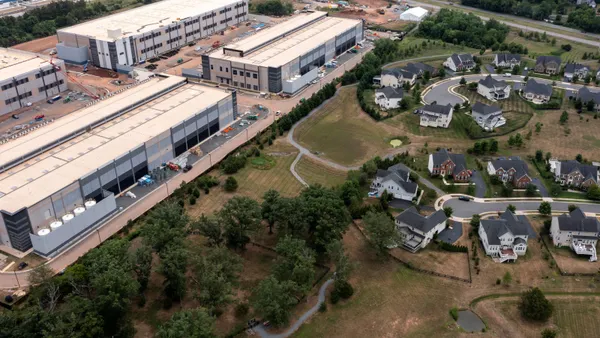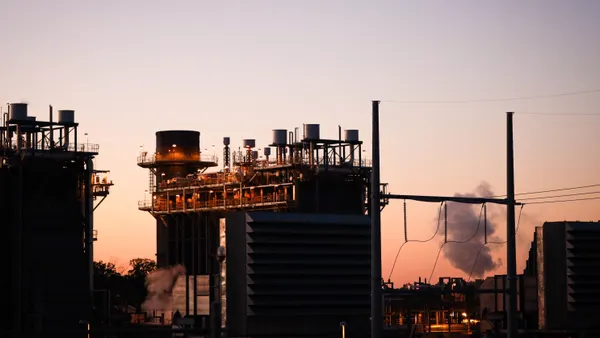Updated: Oct. 14, 2019: The American Coalition for Clean Coal Electricity (ACCCE) asked state regulators to send letters to FERC pushing for action on the commission's resilience docket, Bloomberg reported Friday. Private emails from Jon McKinney, a consultant for ACCCE and former West Virginia Utilities Commissioner urged regulators to send letters to the federal commission based on a template the group had written.
"Given the importance of public utility commissioners, we hope that you and other commissioners will send a letter to FERC requesting that the commission make a decision and issue an order as expeditiously as possible with regards to the resilience docket," wrote McKinney.
Montana Public Service Commission Chair Brad Johnson maintains he wrote his letter independently, despite its similarities to ACCCE's template and the timing of the letter.
Dive Brief:
-
Six state regulators are pressing the Federal Energy Regulatory Commission (FERC) to prioritize its resilience docket, citing concerns over rapid coal plant retirements, Bloomberg first reported Monday.
-
Utility commissioners from Wyoming, Montana, Alabama, Tennessee, West Virginia and Kentucky wrote separate letters to FERC, asking the commission to take action on the resilience docket opened in response to its unanimous rejection of the Department of Energy's bid to subsidize coal and nuclear resources.
- FERC had largely kicked the question of resilience over to regional transmission organizations (RTOs) and independent system operators (ISOs). "The fact that FERC hasn't acted in an [administrative] docket like this is not particularly unusual," Jeff Dennis, managing director and general counsel at Advanced Energy Economy told Utility Dive. "It really just reflects the fact that the inquiry didn't reveal any need for FERC to take any action."
Dive Insight:
Although FERC has not moved on the resilience docket recently, the topic remains a priority for Chair Neil Chatterjee, who in March floated transmission investments as a potential solution and has since reiterated the idea.
"Transmission is one of those special issues in our government that tends to garner broad support for leaders across the political spectrum," Chatterjee told a crowd at Clean Energy Week on Thursday. "We need a grid that provides a high degree of reliability, but that's also flexible enough to accommodate the fast pace of change we've all been discussing."
The states in their letters pointed to coal retirements dominant across the PJM Interconnection, Midcontinent ISO (MISO), Electric Reliability Council of Texas (ERCOT) and Southwest Power Pool (SPP) regions, and called for federal regulators to make "a decision on the docket and Issue an order in a timely manner."
"[S]ubstantial baseload retirements, especially coal-fired units, and the evolution of the electric power sector, are bringing increased attention to grid resilience and fuel security," Montana Public Service Commission Chairman Brad Johnson wrote in his letter.
Grid operators filed comments with FERC in May 2018, which for the most part argued FERC should not change the way power plants are compensated for power supplied to the grid, except PJM, which had earlier argued FERC should compensate resources for their resilience attributes.
Since then, operators say they have taken independent steps to improve resilience within their markets.
"While we stand ready to follow FERC's direction to the broader industry, PJM has already taken a number of actions to make the electric system better equipped to operate through and recover from major catastrophic events," PJM spokesperson Jeff Shields told Utility Dive. "PJM has documented that the grid is reliable under current and future fuel mix scenarios."
The states' letters were sent independently of each other, Montana PSC spokesperson Drew Zinecker told Utility Dive, adding that the issue of resilience related to retiring coal and nuclear plants has "been a concern amongst commissioners throughout the country ... especially in the Midwest and the Northwest."
Montana does not operate any nuclear plants and has restrictions on new nuclear construction that would require voter approval to overcome, so the state is more concerned with coal, which made up over half its generation in 2017, followed by hydropower.
Federal aid has been floated as an avenue to save the state's 2,094 MW Colstrip plant after a bill to help save it failed in April.
"Our commissioners all have different opinions on whether they'd like to see government subsidies," said Zinecker. "It's very diverse as you look throughout, not just the commission, but throughout our legislature, as well. So, there's definitely multiple options on the table."
But it's unclear what exactly state regulators are asking the federal government to do in the letters. Wyoming PSC Chair Kara Fornstrom declined to comment and Alabama Commissioner Chris Beeker Jr. did not return Utility Dive's request for comment by time of publication.
Montana Chair Johnson "would just like to see some sort of definitive action one way or another because then that helps everybody else moved forward," said Zinecker "There's just so many unknown questions and uncertainties moving forward, that we need a higher power to act on things before everything can start to fall into place."
But because the docket is an inquiry, not a proposed rule that the commission could take final action on, or a show cause order where it could direct ISOs and RTOs to do something based on evidence found, there doesn't seem to be any obvious action FERC could take, said Dennis.
The state commissioners "ask for a decision on the docket and an order in a timely fashion, but it's unclear to me what decisions they would like to see made or what order FERC could even issue," he said.














